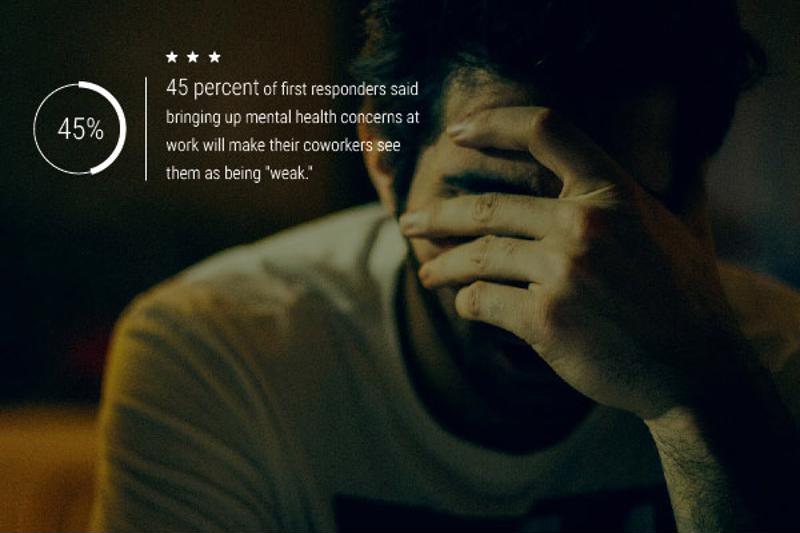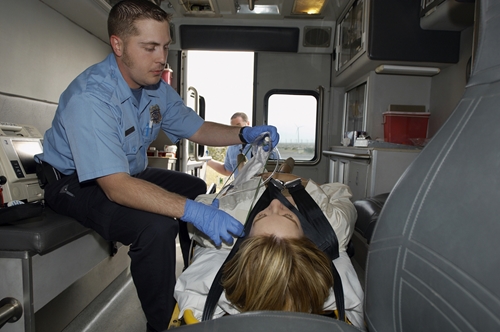Working as a first responder goes above and beyond clocking in and out each day – there are high stakes involved with managing a crisis or natural disaster. Due to these unique job hazards, first responders are also at a greater risk for stress, depression and even post-traumatic stress disorder. Without the right treatments and help, these mental health problems can become more serious as time passes and should be addressed as soon as possible.
From community support groups to yoga classes, there are many ways first responders can alleviate the stress and mental health detriments associated with their jobs.
How prevalent are mental health problems for first responders?
Occupational stress is a built-in consequence for most first responder jobs, be they firefighter, police officers, EMTs or paramedics. If left untreated, stress negatively impacts the mind, body, behavior and mood of anyone, no matter how disciplined he or she is. The mind becomes more anxious and depressed while the body's health deteriorates with a weakened immune system and higher blood pressure. Job satisfaction and productivity suffer as well, which can be dangerous for both first responders and the people they're protecting.
"85% of first responders experienced symptoms related to mental health issues."
Unfortunately, these issues are all too common among these professions. A recent study conducted by Harris Poll on behalf of University of Phoenix showed up to 85 percent of first responders experienced symptoms related to mental health issues. These stem from a variety of reasons, but a major contributor is the 84 percent of respondents experiencing on-the-job trauma.
A little more than a third of first responders surveyed said a doctor has diagnosed them with PTSD or depression. Of those individuals suffering from depression, 47 percent said something that happened at work contributed to their depression.
Despite the prevalence of mental health issues among first responders, workplace stigmas still linger for those who want help. Even though 74 percent of respondents said they have mental health services readily available to them, 39 percent said there are negative repercussions for utilizing these services. These repercussions include:
- 55 percent believe seeking mental help will make their supervisor treat them differently.
- 45 percent said bringing up mental health concerns at work will make their coworkers see them as being "weak."
- 34 percent said starting discussions about mental health concerns at work will reduce their chances of earning a promotion.

Although there are obstacles for some people, 61 percent of respondents still felt comfortable discussing these problems with their supervisor.
According to the Centers for Disease Control and Prevention, the duties that accompany being a first responder can lead to three types of stress:
- Day-to-day stress – caused by common tensions experienced in our lives, such as personal, familial or social issues.
- Cumulative, chronic stress or strain – caused by the accumulation of these daily stressors, whether it's working with new people, changes in job routines or introducing difficult new systems or procedures.
- Critical incident stress or shock – caused by exposure to traumatic or extreme incidents out of the norm, such as witnessing an accident, injury or death.
Unchecked, long-term exposure to any of these types of stress, but especially the third one, leads to:
- Post-traumatic stress symptoms.
- Burnout or compassion fatigue.
- Anxiety.
- Depression.
- Pathological grief.
- Interpersonal conflict, such as family or marital problems.
It's best if first responders deal with these mental health issues head-on to obtain any necessary medication or treatments.
Ways for first responders to manage mental health problems
There are several ways first responders can handle the issues that arise among workers in this area due to their unique occupational stressors. Each of these methods has its own benefits, and may work differently for every individual.
Treatment and therapy
In the early stages of their careers, first responders should take advantage of any job-offered pre-exposure training and "Psychological First-Aid" after an incident. These before-and-after sessions help first responders prepare mentally and emotionally for the initial exposure to a traumatic event and the potential fallout. Not all first responder departments have access to these kind of services, but there are still other ways for individuals to find help.
The University of Phoenix survey found that 61 percent of first responders have not sought out professional help for their mental health problems. Speaking with a psychologist, psychiatrist, therapist or occupational therapist is always a helpful way for first responders to get a better handle on any mental health issues – an important initial step toward successful treatment. Even if the professional doesn't make a diagnosis of a serious mental health problem, he or she can still recommend supplemental programs or services that can assist in alleviating job-related stress.
Self-care techniques
In addition to seeking out professional help in dealing with mental health issues, there are many self-care techniques first responders can incorporate into their daily habits to help alleviate the pressures and problems associated with stress. Often these actions are critical in ensuring first responders can successfully cope and continue to do their job.
The CDC listed several actions for maintaining self care during difficult times, including:
- Practice breathing and relaxation techniques. Consider yoga or meditation as well.
- Avoid working more than 12 hours per shift, if possible.
- Communicate feelings and experiences – whether it's writing in a journal or talking to family, friends, coworkers or anyone willing to listen.
- Eat healthy, exercise regularly and sleep adequately.
- Remember that saying "No" is a possibility – there are others who can help in responding.
While these techniques won't address severe stress, they can help limit exposure to stressful situations. For more serious cases, first responders should speak with a professional and licensed therapist.

